

The Largest Vocabulary in Music. Inspired by The largest vocabulary in hip hop, I wanted to do a similar analysis across a more generalised list of musicians.
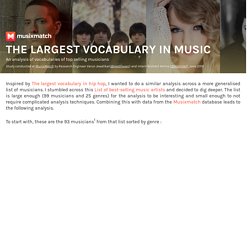
I stumbled across this List of best-selling music artists and decided to dig deeper. The list is large enough (99 musicians and 25 genres) for the analysis to be interesting and small enough to not require complicated analysis techniques. Combining this with data from the Musixmatch database leads to the following analysis. To start with, these are the 93 musicians1 from that list sorted by genre : 1 Bruce Springsteen, Chicago, Def Leppard, Journey, The Beach Boys and The Doors from the original list of 99 musicians don’t grant permission to Musixmatch to use their lyrics. The aim is to compare the vocabulary size of these musicians.
To prevent the analysis from being skewed purely by the number of songs released, the vocabularies are compared across the 100 densest songs (by total number of words) that they have released. Lexical Priming: A new theory of words and language is more than just about words, it is about language and how it is structured.
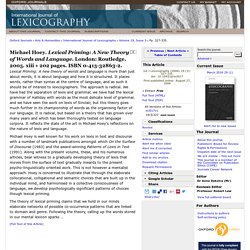
It places words, rather than syntax at the centre of language, and as such it should be of interest to lexicographers. The approach is radical. Language Awareness: Lexical priming. Language Awareness by Professor Michael Hoey, Baines Professor of English Language, University of Liverpool • Grammar and vocabulary - the traditional view of language • A new view of language • A case study: ‘the time has come’ • What it means to ‘know’ a word.
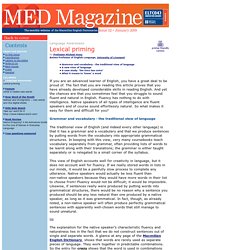
Toward Understanding Syntactic Processing and Phonological Awareness in Specific Language Impairment. Subject-verb agreement and tense agreement conditions for the ten participants were binned together to make two main conditions: syntactically correct and syntactic violation.
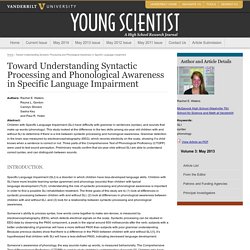
Cluster randomization analysis on this pair of conditions revealed one significant cluster of electrodes (cluster p=0.048), showing increased amplitude for the violation condition. The cluster stretched from 430ms to 900ms, which is the expected range of the P600 component, after the onset of the critical-word at 0 ms. Figure 2A compares ERPs from correct and violation conditions and illustrates a difference in the P600 between these conditions. This difference indicates that TLD participants detect grammatical violations in sentences when these violations include incorrect subject-verb agreement and incorrect tense agreement. The significant cluster (430ms to 900ms after the onset of the critical verb) is distinguished by dotted lines towards the middle and end of the graph. Cluster at various time points. 1. 2.
P455.pdf. Word2vec - Tool for computing continuous distributed representations of words. How Long Does it Take to Learn a New Language? How long does it really take to learn a second language?
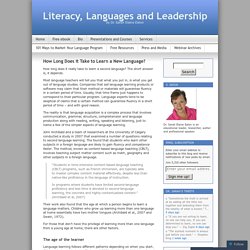
The short answer is, it depends. Most language teachers will tell you that what you put in, is what you get out of language studies. Companies that sell language learning products or software may claim that their method or materials will guarantee fluency in a certain period of time. Usually, that time frame just happens to correspond to their particular program. How many words are there in the world's most widely spoken languages? Welcome to Part 2 of my post on “How many words do I need to know?

The 95/5 rule in language learning”. If you haven’t done so already, read through Part 1 before continuing! How many words do I need to know? The 95/5 rule in language learning, Part 1/2 - Lingholic. A very common question that people ask when starting the study of a foreign language is “How many words do I need to know in order to be conversationally fluent for everyday talk in X language?”

This is a very good question, and one that I will try to answer to the best of my ability in part 2 of this post, but first of all, let me ask you this: Have you ever wondered how many words there are in your language? Well, this is the wrong question, in fact, since there is no single sensible answer to this question. Center for Development and Learning. By Susan Ebbers Sequestration is upon us.
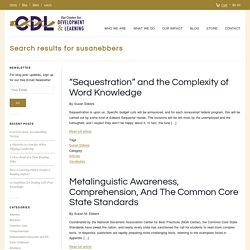
Specific budget cuts will be announced, and for each nonexempt federal program, this will be carried out by some kind of Edward Sequester Hands. The incisions will be felt most by the unemployed and the furloughed, and I expect they won’t be happy about it. In fact, the tune […] Read full article. Basic German Vocabulary - basic words in German: Zertifikat Deutsch and Deutsch-Test für Zuwanderer, A1, A2, B1. Browse Oxford 3000 word list from a to almost in English Dictionary at OxfordLearnersDictionaries.com. English language corpora in the foreign language classroom. The link between findings of corpus-based research and (foreign) language teaching is that corpus evidence suggests which language items and processes are most likely to be encountered by language users (what is frequent and typical) and may thus deserve more time in classroom instruction.
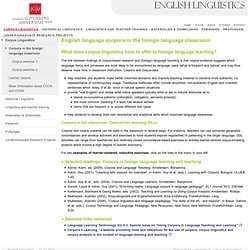
Corpora and corpus-data help teachers and students make better informed decisions and improve teaching material to become more authentic, i.e. representative of contemporary usage. Traditional textbooks often include simplified, non-authentic English and invented sentences which rarely, if at all, occur in natural speech situations. Corpora in the classroom: Data-driven learning (DLL) Corpora and corpus material can be used in the classroom in several ways. For two examples of learner-centered, inductive exercises, click on the links in the menu to your left. Paul Nation. Paul Nation Paul Nation is Emeritus Professor of Applied Linguistics in the School of Linguistics and Applied Language Studies at Victoria University of Wellington, New Zealand.

He has taught in Indonesia, Thailand, the United States, Finland, and Japan. Paul Nation - School of Linguistics and Applied Language Studies. BEdStud MA (Hons) DipTESL Paul Nation is Emeritus Professor in Applied Linguistics at the School of Linguistics and Applied Language Studies (LALS) at Victoria University of Wellington, New Zealand. His specialist interests are the teaching and learning of vocabulary and language teaching methodology. He has taught in Indonesia, Thailand, the United States, Finland and Japan.
Recent books A recent book What you need to know to learn a foreign language pdf798KB is available to to dowload. Compleat Lexical Tutor. First 2000 Most Common Words in. Top 2000 English Vocabulary Words used in Speaking. Pronunciation of ipsative - how to pronounce ipsative correctly. This site uses Copyright © Tim Bowyer 2006-14 • All rights reserved U.S. Patent No. 20040162719 • Howjsay in: Deutsch • Français • Italiano • Español • Requests, Errata etc. Lexical Notebook. Lingo.stanford.edu/sag/LI11-SBCG/slides/6class-mwe-slides.pdf. Multiword Expressions - ACLWiki. Multiword expressions (MWEs) are expressions which are made up of at least 2 words and which can be syntactically and/or semantically idiosyncratic in nature.
Moreover, they act as a single unit at some level of linguistic analysis. According to Sag et al.[1] we could define MWEs roughly as „idiosyncratic interpretations that cross word boundaries“. MWEs can be regarded as lying at the interface of grammar and lexicon, usually being instances of well productive syntactic patterns but nevertheless showing a peculiar lexical behaviour.[2] Besides, they are commonly used in any field of language – Jackendoff[3] estimates the number of MWEs in a speaker's lexicon as comparable to the number of single words. Examples for MWEs would be idioms as „kick the bucket“, compound nouns as „telephone box“ and „post office“, verb-particle constructions as „look sth. up“ or proper names as „San Francisco“.
Aussprache von hazardous: Wie man hazardous auf Englisch ausspricht. Aussprache von hazardous: Wie man hazardous auf Englisch ausspricht 2.319.856 Wörter 2.468.559 Aussprachen 318 Sprachen Einloggen Anmelden Alle Wörter dieser Welt. Ausgesprochen. Sounds Familiar? What you can hear You can listen to 71 sound recordings and over 600 short audio clips chosen from two collections of the British Library Sound Archive: the Survey of English Dialects and the Millennium Memory Bank.
You’ll hear Londoners discussing marriage and working life, Welsh teenagers talking with pride about being bilingual and the Aristocracy chatting about country houses. You can explore the links between present-day Geordie and our Anglo-Saxon and Viking past or discover why Northern Irish accents are a rich blend of seventeenth century English and Scots. You can study changes in pronunciation among the middle classes or find out how British Asians express their linguistic identity. What you can do. Resource Guide Online Language Policy and Planning. Introduction Language planning is generally defined as an intervention intended to influence language or language use.
Cooper (1989) defines language planning as "deliberate efforts to influence the behavior of others with respect to the acquisition, structure, or functional allocation of their language codes" (p. 45). Blommaert (1996) extends the scope of language planning "to cover all cases in which authorities attempt, by whatever means, to shape a sociolinguistic profile for their society" (p. 207). The objectives are usually social, political, or economic in character.
Test Your Vocabulary Online With VocabularySize.com – FAQ. Readability index calculator. Vocabulary. Vocabulary refers to the words we must understand to communicate effectively. Educators often consider four types of vocabulary: listening, speaking, reading, and writing. Vocabulary Assessment and Instruction. List of Pronouns. Before you look at the list of pronouns, let's have a quick refresher on the definition of a pronoun.
Quick Refresher A pronoun is a word that takes the place of one or more nouns. If you want more information on these guys, check out the pronouns page. Www.smart-words.org/linking-words/linking-words.pdf. Transition Words & Phrases. Conjunctions. Words which connect words, phrases, clauses or sentences are called conjunctions (see "to conjoin" = join, unite). Word Power. Word Power. Extensive Reading Central. EFL Classroom 2.0. About www.manythings.org/vocabulary. English Vocabulary Word List - Parts Of The Body. Comprehensive English Vocabulary Word Lists.
SAT Word Lists : Vocabulary Word lists for the SAT. Each of the 10 word lists contains 100 important words. Make a commitment to learn one list a week. Go through each list and test yourself (or, better still, get a friend to test you) one week later to reinforce your learning. Remember - work on vocabulary is never a waste of time. It pays dividends in terms of your final SAT score, but more importantly, it makes you a more educated person. We have also produced 10 vocabulary lists for you to refer to when doing the real tests from the Official SAT study guide. Word focus. AAC Core Vocabulary Communication System.
In order to understand how Minspeak allows for independent communication, it is important to understand what is meant by core vocabulary and how everyone uses it, no matter their age or activity. Appendix:Basic English word list. Technology and Informal Education: What Is Taught, What Is Learned. Jwhanks. New General Service List. General Service List. Www.fltr.ucl.ac.be/fltr/germ/etan/bibs/vocab/cup.html. Vocabulary: Concepts and Research. New Research on Early Disparities: Focus on Vocabulary and Language Processing. Pearson Prentice Hall: eTeach: Strategies for Vocabulary Development. Effective Strategies for Teaching Vocabulary.